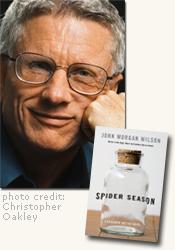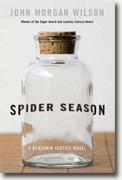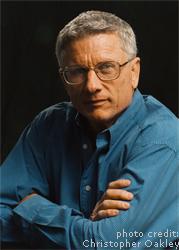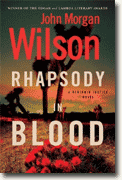author interview
book reviews:
· general fiction
· chick lit/romance
· sci-fi/fantasy
· graphic novels
· nonfiction
· audio books
· author interviews
· children's books @
curledupkids.com
· DVD reviews @
curledupdvd.com
newsletter
win books
buy online
links
home
for authors
& publishiss
for reviewers

|
|||||
 
Contributing editor Michael Leonard interviewed Spider Season Interviewer Michael Leonard: Spider Season John Morgan Wilson: In Spider Season How it difficult or challenging was it to integrate the seemingly disparate elements of Ben’s early life into this novel and still write a compelling murder mystery? Spider Season Ostensibly, Ben wrote his memoir, Deep Background, to finally put some of the demons of his past to rest. Do you think he’s surprised when the book stirs up so much trouble and brings on the “pack of snarling dogs”? Well, given how he reacts in the story, I'd say he is certainly surprised, and then some. But surprise gives way to fear, then paranoia, and eventually grief, as the harassment and intimidation grows more dangerous and hits closer to home. Making matters worse for Benjamin, he feels responsible for the trouble that ensues and what others suffer, a deep, unforgiving guilt that he's carried most of his life. The scene when Benjamin first battles with Lance outside of Fred and Maurice’s West Hollywood home gives us some early clues into Ben’s current psyche. Obviously the testosterone shots contribute to his state of mind, but what else is at work here? Benjamin grew up with an alcoholic, abusive father. A running theme throughout the novels, and again in Spider Season
In Spider Season Ben’s fiftieth birthday approaches, and he’s reached a point where he’s beginning to question his achievements, or lack thereof - his past feels littered with of bad choices and trouble. Why does Ben remain such a sympathetic character and a gutsy, effective protagonist? I'm glad you see him that way, because he is definitely a flawed and complicated man who sometimes finds trouble where he doesn't need to. In the end, though, I think he's basically a decent guy who tries to do the right thing, and is always willing to take up the cause of the underdog, with whom he identifies so strongly. He carries a lot of emotional baggage, and it weighs heavily on him, but he's aware of it and always trying to dump the load. I also think Benjamin's voice -- that is to say, the first person narrative voice in which I write the series -- might have something do to with it. Readers often tell me that the voice connects with them in a very direct way, that they feel as if Benjamin is talking to them, and revealing so much of himself in the process. I hope it makes him more human, someone to root for despite his maddening complexity. This seems to be a deeply reflective time for Benjamin, thinking of all the people he has abandoned and the challenges that he’s run away from, especially his true love, Jacques, who needed him the most in his last dying days. Why does Ben continue to blunt the pain of Jacque’s death? Justice is someone who feels very deeply but deadens the pain through alcohol, violence, and taking care of other people's problems instead of his own. (Though in Spider Season Benjamin’s anger always seems to be percolating in the background. What part does Ismael Aragon, the “tawny Aztec beauty,” play in keeping Ben‘s anger in check? What is it about Ismael that keeps Ben on a more compassionate track? While hardly perfect and without troubling questions of his own, Ismael Aragon, an ex-priest, demonstrates a special kind of goodness, decency and forgiveness, an unselfishness, if you will, that draws Benjamin to him. Benjamin sees in Ismael qualities Benjamin wishes he could muster. Ismael inspires Benjamin to be a better person and loves him unselfishly, and touches Benjamin's heart as no one else ever has, perhaps not even Jacques, Benjamin's first serious love. Both Benjamin and Ismael come across as damaged souls, but damaged in different ways. They have vastly different personalities with different life experiences. What initially attracts them to each other? Well, besides a strong sexual attraction for each other, I guess I answered that one with the last questions. I would add that part of what attracts Ismael to Benjamin is Ismael's essentially kind nature, and the need to take care of people, to help people in need. This can often be a bad reason to get involved with someone with a history of self-destruction, but opposites also often attract, and it can work out. Both men also have a deep and profound yearning for family and want this relationship to work. Will it work? Time will tell. How does Benjamin’s possible connection to Lance complicate his investigation into the murder of Silvio Galiano? The presence of Lance, who hovers over and around Benjamin's life in mysterious and seemingly intimidating ways, certainly complicates things. For one thing, we don't know for some time whether the mysterious Lance or the obsessive Jason Holt are responsible for the harassment, at least not for many chapters. And we never know quite what Lance is up to until the latter half of the novel. And by then he's disappeared. Or has he? It causes all kinds of complications for Benjamin, not the least of which are emotional, sending Benjamin on an emotional roller coaster ride.
I don't plan ahead on these things. They happen in the writing. The opening scene with the stalking feral cat and the hysterical shrieking crows is something I experienced right outside my West Hollywood house. I thought it was an ominous and effective way to open my story, and it kind of established a symbolic thread, if you will, involving wild creatures. The title, Spider Season Cathryn Conroy is a fascinating character, a tough-minded and focused drinker, perhaps a female version of how Benjamin used to be. Do you think Ben sees himself in Cathryn? Benjamin certainly sees a lot of himself in Cathryn but he's most uncomfortable when he senses she's on to something as a reporter that he'd rather not have exposed. Fred and Maurice play a far larger part in this installment, while the lovely Alexandra Templeton seems to take more of a back seat. Alexandra is growing apart from Benjamin and getting on with her own life, while Fred and Maurice seem to be closer to Ben. Why did you decide to give Fred and Maurice a much bigger role in this installment? The story dictates which characters get more stage time. There simply wasn't as much for Alexandra to do in this particular story, the way it played out. Also, the writer of a series needs to find ways to shake it up from time to time, or else the series can become formulaic, stale, in a rut. Jason Holt is almost a caricature of Hollywood gone bad. He’s an insidious and evil creature, spider-like and almost totally out of touch with reality. What gave you the idea for his character? I've reported on and worked in Hollywood, which is to say the film and television industry and its environs and characters, for a few decades. Along the way, I've met quite a few people who are so narcissistic and self-absorbed that they seem to be totally out of touch with reality. Hollywood is a magnet for all kind of people, good and bad, realistic and unrealistic.
Where did your inspiration for the artist Charles Wu come from? Is Charles’s situation in life fairly typical of men like him? Wu wasn't based on anyone in particular. I've known a few painters in my time, and one in particular who painted much like Wu does -- geometric shapes seemingly devoid of any feeling -- but Wu isn't directly patterned after any of them. As for gay men who marry women, and the women who marry them, I go into a riff about that in one chapter that readers can look for, if they're interested. But yes, I do think he's fairly typical of one type of man who marries one type of woman -- a women who knows he's gay and like him that way, for a number of reasons that are explored in Spider Season I couldn’t help but be struck by Ben’s romantic - and sometimes sexual - impulsiveness. What drives Benjamin’s need for love and acceptance? Will Benjamin ever learn from his failings? Loneliness is another theme that's explored Benjamin. It's haunted him most of his life, for reasons that should be clear in the book. In one scene, Benjamin elderly landlord Maurice is having a serious conversation with him that goes like this: “You’ll learn soon enough, if you haven’t already, that companionship with someone you respect and care deeply about is what makes life bearable, even worthwhile.
Well, they are both gay men who have been involved in the Church -- Ismael as a priest, Benjamin as someone raised in the church and now a lapsed Catholic. They both have experienced the guilt the Church can instill in a man who loves men, the pain and conflict it can inflict. And they are both very aware of the hypocrisy of the Church in dealing with the sex abuse crisis that exposed thousands of priests and Church officials as child molesters or as culpable in the cover up. Both men have a strong sense of justice for the victim and the downtrodden and the behavior of the Church has repulsed them and, ironically, helped unite them. Memory as a theme repeats throughout the novel. For Ben, memory proves to be “a slippery thing.” How important is memory, particularly in the way that it has formed and shaped Ben’s life up until now? He's been in denial about a lot of things, partly out of guilt, partly out of self survival, partly to avoid the pain of choices badly made. Which is true of most of us, I imagine. I grew up in a family where there was both physical and sexual abuse inflicted by a violent stepfather. As I grew older, I was astounded to see both my stepfather and my mother convince themselves that nothing remotely abusive had ever occurred in our family. They slipped deeper and deeper into denial until they were true believers that nothing wrong had ever been done. It was a startling lesson to learn about levels of self-deception and self-delusion.
Toward the end of the novel, Maurice comments to Benjamin that he’s a man who “always looks for the dark side in life and in people.” What exactly does Maurice mean? Benjamin has been shaped to a great extent by his dark and violent past. It's hard for him to trust, to believe in the goodness of people, though he desperately wants to. In Spider Season It's a sprawling, noisy, crowded, messy and amazingly diverse metropolis, a place built to a great extent on dreams and illusions -- Hollywood again -- that has spread like a cancer from the mountains to the desert to the sea, with no signs of slowing down. There are good stories in every community, from tiny town to enormous city. L.A. just has a whole lot of them, with lots of interesting backdrops. I grew up here and know it well, so I write about it. Benjamin Justice has lived here, first as an inquisitive reporter, for many years. He owns a car. Anyone with a car can hop on the freeway and explore at will, which he does. You also imbue Spider Season I actually got caught in a time crunch regarding the publication of Spider Season As in your other novels, Spider Season Whenever I've based a character on a real person, I've always asked their permission beforehand, and I've identified those people in the acknowledgments pages in my novels. I've done the same with names I've borrowed from friends and colleagues. But the vast majority of my characters are purely fictional. I've only based a few characters on real life men and women, again, with their permission. If I do borrow a tic or characteristic from a real person, it's always just an ingredient or two that goes into a composite character who often has elements inspired by many other real people. How much of you is in Benjamin Justice? Inevitably, a strong protagonist, especially written in the first person, is the alter ego of the author. I wouldn't want to parse it specifically or quantitatively. I'd like to leave Benjamin Justice as the fictional character he is, with some mystery to him. I can tell you that he's a lot braver and more reckless than I am, and that, unlike Benjamin, I still have all my hair. Do you have another Benjamin Justice novel planned? If so, can you share something about it? At this time, I do not have another Benjamin Justice novel planned. Spider Season How has the Benjamin Justice Series been received by the critics and the public-at-large? What kind of reaction have you had from the fans of Benjamin Justice? And ultimately, what would you like readers to take away from the lessons of Benjamin Justice? As with most novelists, the reviews have been mixed, though generally positive. Some of the novels have gotten flat out raves. Simple Justice, the first in the series, won the Edgar Allan Poe Award (AKA "the Edgar") from Mystery Writers of America for best first novel. That's a very prestigious award in the mystery genre, dubbed "the Oscar of mystery writing" by some. The Benjamin Justice series has also won three Lambda Literary Awards from the Lambda Literary Foundation for best gay men's mystery. Some of the novels are better than others, I think. You do your best each time out but each novel will be influenced by all kinds of factors, including imagination, health, finances, relationships, and on and on.
John Morgan Wilson is the author of several novels in the Benjamin Justice series as well as two co-written books with band leader Peter Duchin. He's the winner of the Edgar Award and three-time winner of the Lambda Literary Award for the Benjamin Justice novels. He lives in West Hollywood, CA. You can read the first chapter of his novel Spider Season at his website, www.johnmorganwilson.com. Contributing editor Michael Leonard interviewed John Morgan Wilson, author of Spider Season (A Benjamin Justice Novel) (see accompanying review), about his book for curledup.com. Michael Leonard/2009.
|
|||||
| fiction · sf/f · comic books · nonfiction · audio newsletter · free book contest · buy books online review index · links · · authors & publishiss reviewers |
|
| site by ELBO Computing Resources, Inc. | |



